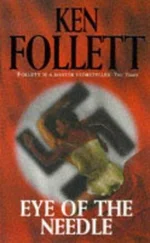Ken Follett - Winter of the World (Century Trilogy 2)
Здесь есть возможность читать онлайн «Ken Follett - Winter of the World (Century Trilogy 2)» весь текст электронной книги совершенно бесплатно (целиком полную версию без сокращений). В некоторых случаях можно слушать аудио, скачать через торрент в формате fb2 и присутствует краткое содержание. Жанр: Старинная литература, на английском языке. Описание произведения, (предисловие) а так же отзывы посетителей доступны на портале библиотеки ЛибКат.
- Название:Winter of the World (Century Trilogy 2)
- Автор:
- Жанр:
- Год:неизвестен
- ISBN:нет данных
- Рейтинг книги:5 / 5. Голосов: 2
-
Избранное:Добавить в избранное
- Отзывы:
-
Ваша оценка:
- 100
- 1
- 2
- 3
- 4
- 5
Winter of the World (Century Trilogy 2): краткое содержание, описание и аннотация
Предлагаем к чтению аннотацию, описание, краткое содержание или предисловие (зависит от того, что написал сам автор книги «Winter of the World (Century Trilogy 2)»). Если вы не нашли необходимую информацию о книге — напишите в комментариях, мы постараемся отыскать её.
Winter of the World (Century Trilogy 2) — читать онлайн бесплатно полную книгу (весь текст) целиком
Ниже представлен текст книги, разбитый по страницам. Система сохранения места последней прочитанной страницы, позволяет с удобством читать онлайн бесплатно книгу «Winter of the World (Century Trilogy 2)», без необходимости каждый раз заново искать на чём Вы остановились. Поставьте закладку, и сможете в любой момент перейти на страницу, на которой закончили чтение.
Интервал:
Закладка:
In front of City Hall, red flags fluttered above a crowd of several thousand, most of them wearing Communist Party badges. Loudspeaker trucks blared angry speeches, and the crowd chanted: ‘Down with the secessionists.’
Carla did not see how she was going to reach the building. A handful of policemen looked on uninterestedly, making no attempt to help councillors get through. It reminded Carla painfully of the attitude of police on the day the Brownshirts had trashed her mother’s office, fifteen years ago. She was quite sure the Communist councillors were already inside, and that if Social Democrats did not get into the building the minority would pass the decree and claim it to be valid.
She took a deep breath and began to push through the crowd.
For a few steps she made progress unnoticed. Then someone recognized her. ‘American whore!’ he yelled, pointing at her. She pressed on determinedly. Someone else spat at her, and a gob of saliva smeared her dress. She kept going, but she felt panicky. She was surrounded by people who hated her, something she had never experienced, and it made her want to run away. She was shoved, but managed to keep her feet. A hand grasped her dress, and she pulled free with a tearing sound. She wanted to scream. What would they do, rip all her clothes off?
Someone else was fighting his way through the crowd behind her, she realized, and she looked back and saw Heinrich von Kessel, Frieda’s husband. He drew level with her and they barrelled on together. Heinrich was more aggressive, stamping on toes and vigorously elbowing everyone within range, and together they moved faster, and at last reached the door and went in.
But their ordeal was not over. There were Communist demonstrators inside too, hundreds of them. They had to fight through the corridors. In the meeting hall the demonstrators were everywhere – not just in the visitors’ gallery but on the floor of the chamber. Their behaviour here was just as aggressive as outside.
Some Social Democrats were here, and others arrived after Carla. Somehow most of the sixty-three had been able to fight their way through the mob. She was relieved. The enemy had not managed to scare them off.
When the speaker of the assembly called for order, a Communist assemblyman standing on a bench urged the demonstrators to stay. When he saw Carla he yelled: ‘Traitors stay outside!’
It was all grimly reminiscent of 1933: bullying, intimidation, and democracy being undermined by rowdyism. Carla was in despair.
Glancing up to the gallery, she was appalled to see her brother, Erik, among the yelling mob. ‘You’re German!’ she screamed at him. ‘You lived under the Nazis. Have you learned nothing ?’
He seemed not to hear her.
Frau Schroeder stood on the platform, calling for calm. She was jeered and booed by the demonstrators. Raising her voice to a shout, she said: ‘If the city council cannot hold an orderly debate in this building, I will move the meeting to the American sector.’
There was renewed abuse, but the twenty-six Communist councillors saw that this move would not suit their purpose. If the council met outside the Soviet zone once, it might do so again, and even move permanently out of the range of Communist intimidation. After a short discussion, one of them stood up and told the demonstrators to leave. They filed out, singing the ‘ Internationale ’.
‘It’s obvious whose command they’re under,’ Heinrich said.
At last there was quiet. Frau Schroeder explained the Soviet demand, and said that it could not apply outside the Soviet sector of Berlin unless it was ratified by the other Allies.
A Communist deputy made a speech accusing her of taking orders directly from New York.
Accusations and abuse raged to and fro. Eventually they voted. The Communists unanimously backed the Soviet decree – after accusing others of being controlled from outside. Everyone else voted against, and the motion was defeated. Berlin had refused to be bullied. Carla felt wearily triumphant.
However, it was not yet over.
By the time they left it was seven o’clock in the evening. Most of the mob had disappeared, but there was a thuggish hardcore still hanging around the entrance. An elderly woman councillor was kicked and punched as she left. The police looked on with indifference.
Carla and Heinrich left by a side door with a few friends, hoping to depart unobserved, but a Communist on a bicycle was monitoring the exit. He rode off quickly.
As the councillors hurried away, he returned at the head of a small gang. Someone tripped Carla, and she fell to the ground. She was kicked painfully once, twice, three times. Terrified, she covered her belly with her hands. She was almost three months pregnant – the stage at which most miscarriages occurred, she knew. Will Werner’s baby die, she thought desperately, kicked to death on a Berlin street by Communist thugs?
Then they disappeared.
The councillors picked themselves up. No one was badly injured. They moved off together, fearful of a recurrence, but it seemed the Communists had roughed up enough people for one day.
Carla got home at eight o’clock. There was no sign of Erik.
Werner was shocked to see her bruises and torn dress. ‘What happened?’ he said. ‘Are you all right?’
She burst into tears.
‘You’re hurt,’ Werner said. ‘Should we go to the hospital?’
She shook her head vigorously. ‘It’s not that,’ she said. ‘I’m just bruised. I’ve had worse.’ She slumped in a chair. ‘Christ, I’m tired.’
‘Who did this?’ he asked angrily.
‘The usual people,’ she said. ‘They call themselves Communists instead of Nazis, but they’re the same type. It’s 1933 all over again.’
Werner put his arms around her.
She could not be consoled. ‘The bullies and the thugs have been in power for so long!’ she sobbed. ‘Will it ever end?’
(iv)
That night the Soviet news agency put out an announcement. From six o’clock in the morning, all passenger and freight transport in and out of West Berlin – trains, cars and canal barges – would be stopped. No supplies of any kind would get through: no food, no milk, no medicines, no coal. Because the electricity generating stations would therefore be shut down, they were switching off the supply of electricity – to Western sectors only.
The city was under siege.
Lloyd Williams was at British military headquarters. There was a short Parliamentary recess, and Ernie Bevin had gone on holiday to Sandbanks, on the south coast of England, but he was worried enough to send Lloyd to Berlin to observe the introduction of the new currency and keep him informed.
Daisy had not accompanied Lloyd. Their new baby, Davey, was only six months old, and anyway Daisy and Eva Murray were organizing a birth control clinic for women in Hoxton that was about to open its doors.
Lloyd was desperately afraid that this crisis would lead to war. He had fought in two wars, and he never wanted to see a third. He had two small children who he hoped would grow up in a peaceful world. He was married to the prettiest, sexiest, most lovable woman on the planet and he wanted to spend many long decades with her.
General Clay, the workaholic American military governor, ordered his staff to plan an armoured convoy that would barrel down the autobahn from Helmstedt, in the west, straight through Soviet territory to Berlin, sweeping all before it.
Lloyd heard about this plan at the same time as the British governor, Sir Brian Robertson, and heard him say in his clipped soldierly tones: ‘If Clay does that, it will be war.’
But nothing else made any sense. The Americans came up with other suggestions, Lloyd heard, talking to Clay’s younger aides. The Secretary of the Army, Kenneth Royall, wanted to halt the currency reform. Clay told him it had gone too far to be reversed. Next, Royall proposed evacuating all Americans. Clay told him that was exactly what the Soviets wanted.
Читать дальшеИнтервал:
Закладка:
Похожие книги на «Winter of the World (Century Trilogy 2)»
Представляем Вашему вниманию похожие книги на «Winter of the World (Century Trilogy 2)» списком для выбора. Мы отобрали схожую по названию и смыслу литературу в надежде предоставить читателям больше вариантов отыскать новые, интересные, ещё непрочитанные произведения.
Обсуждение, отзывы о книге «Winter of the World (Century Trilogy 2)» и просто собственные мнения читателей. Оставьте ваши комментарии, напишите, что Вы думаете о произведении, его смысле или главных героях. Укажите что конкретно понравилось, а что нет, и почему Вы так считаете.












